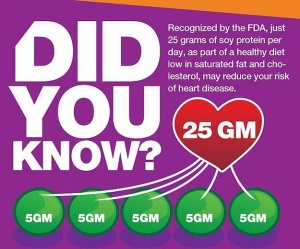For a few years now, soy based products have started to appear on supermarket shelves and have become a part of everyday nutrition for people. Soy has been part of the traditional Asian diet for centuries and it’s now gaining prominence in the Western diet as well.
We call “soy” those foods or food ingredients derived from the soy bean, a type of legume. That includes the typically Asian tofu, tempeh and miso, but also comprises of the recently mass produced soymilks, yoghurts, soy cheese, breads, breakfast cereals and meat alternatives like burger patties, soy sausages and sandwich slices.
You may wonder what the big deal is – well, soy is a vegetarian complete protein, that’s the big deal! Our bodies need a certain daily amount of protein to perform vital roles and if we don’t provide our body with sufficient protein it will break down body tissue instead. Lack of protein can cause growth failure, loss of muscle mass, decreased immunity, weakening of the heart and respiratory system and eventually death.
When you eat protein, which is in meat, eggs, dairy, legumes, nuts and grains, the body disassembles it amino acids, to build new protein later on. There are 21 amino acids but just 9 are essential, which state you need to get them from your food because our body can’t produce them. Different proteins have diverse amino acid composition, some are “complete” (they have all the essential amino acids) while others aren’t. If you don’t get all the essential amino acids (either by having a complete protein or combining incomplete proteins) your body will be deficient.
The ‘best’ sources of complete proteins are typically animal foods, red and white meats (including fish), milk, cheese, yogurt and eggs. That’s quite a problem for vegetarians and also a serious issue for developing countries because they are usually expensive products. Besides that, there are other concerns such as the fat and cholesterol content of most animal protein sources.
Soy protein has a perfect amino acids profile, being an excellent alternative for those people who don’t want or can’t consume animal products. Several research studies have demonstrated that soy offers, besides an excellent source of quality protein, many health benefits. Soy has proved to lower cholesterol levels when up to 25grams per day of a whole bean is consumed, as part of a diet low in saturated fat and cholesterol. This is an important benefit for heart disease risk and cardiovascular health.
Other benefits, which are being reviewed by the experts, may include inflammation reduction, improved immunity and cooling of hot flushes during menopause.
Find those products you like the most and incorporate them in your everyday meals; and if you get the chance, cook with natural whole soybeans from time to time. With so many unhealthy foods on the market contributing to obesity, heart disease and high blood pressure, we have a wonderful chance to improve our healthy habits in such a delightful way!
Incorporating Reliv’s soy based nutrition such as Now with LunaRich®, Classic® and ReShape with LunaRich® ensures you to enjoy Soy’s health benefits every day!


